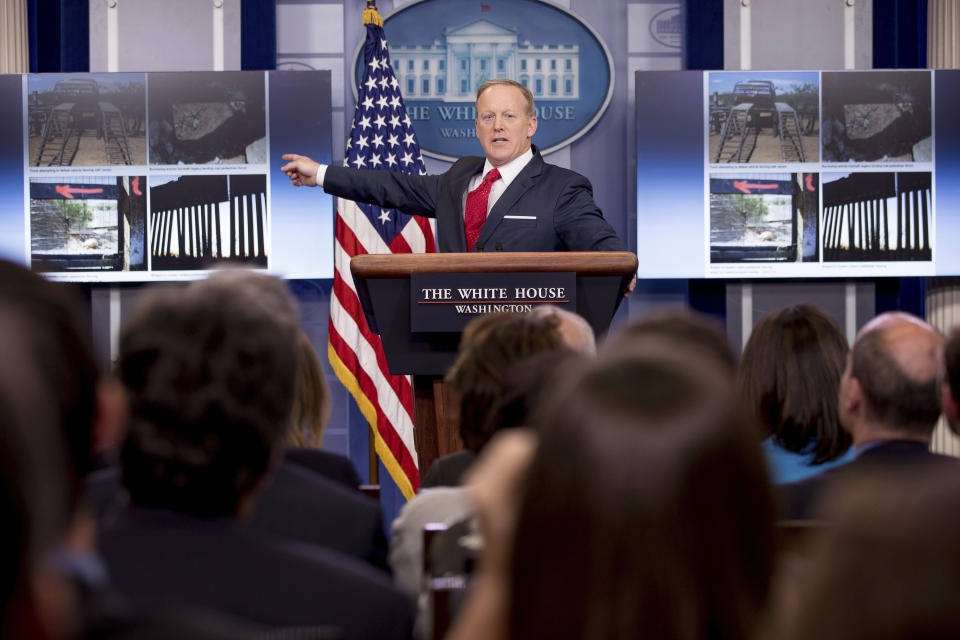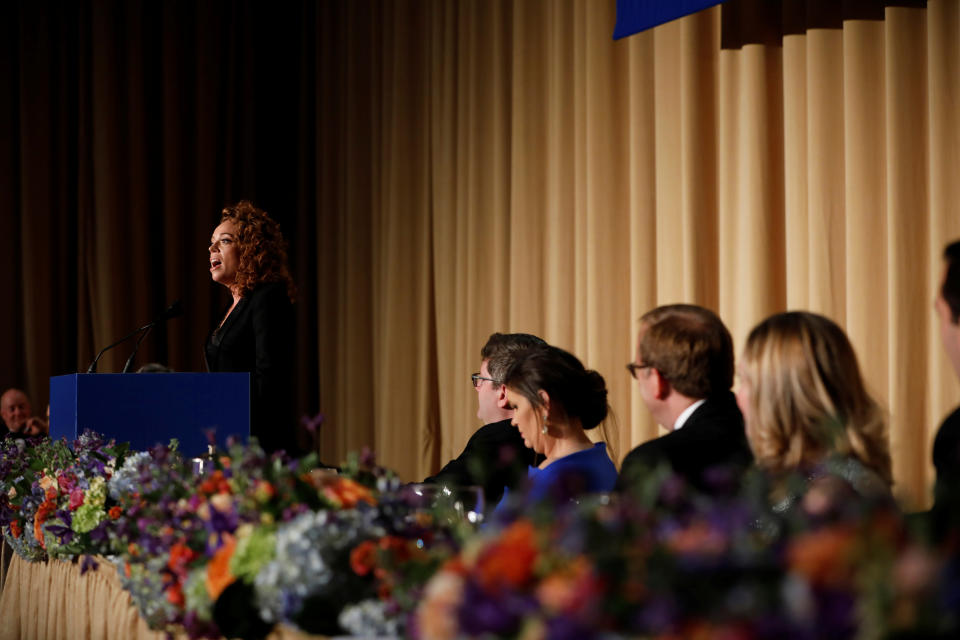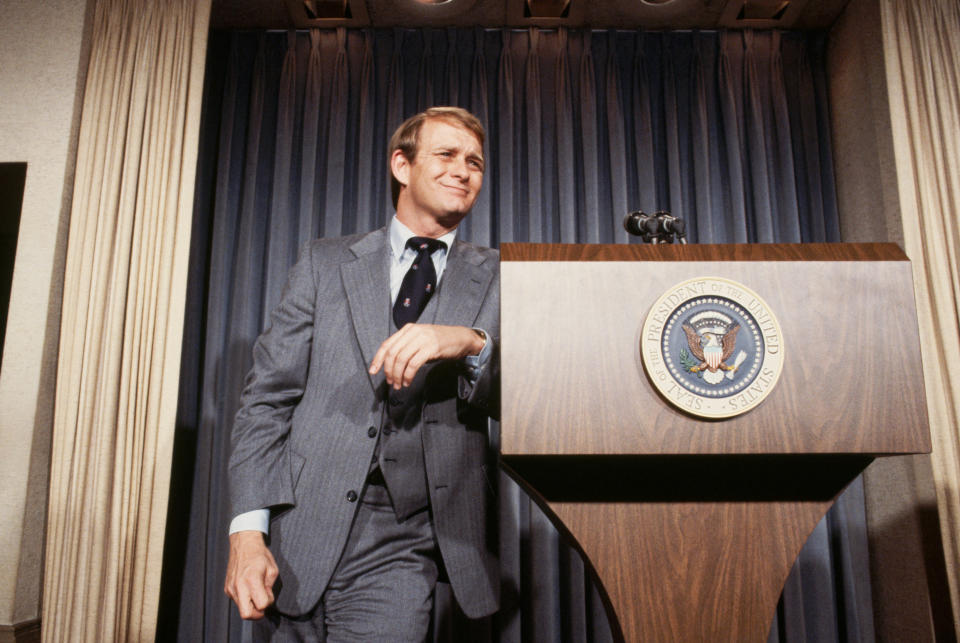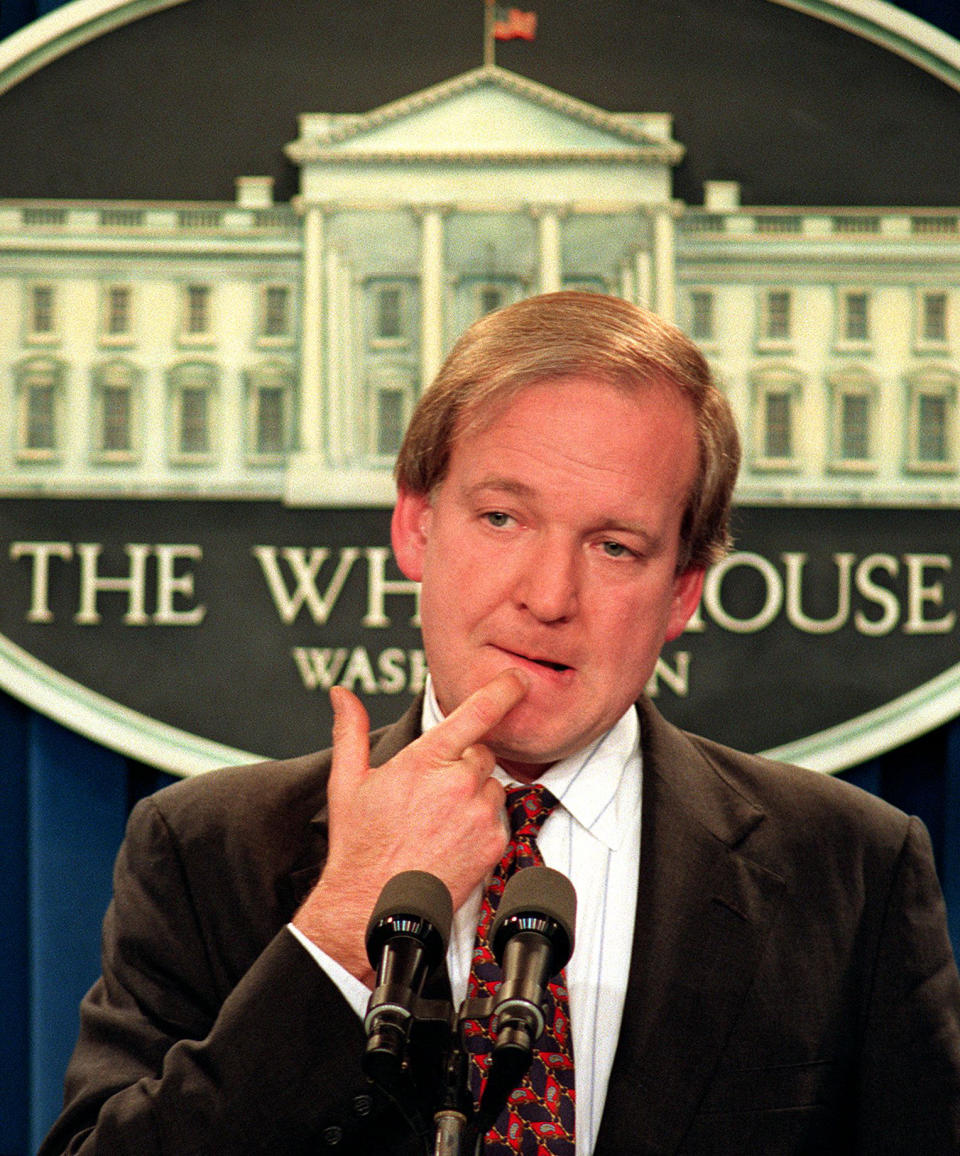Honestly, Sarah Sanders has a problem with the truth

The press secretary was furious, frustrated at how little credibility he had with the press. “I think that some people here are too quick to make unsubstantiated charges or implications that I am lying or that my credibility has been destroyed,” he said. His name was Ron Nessen, and he was the spokesman for President Gerald R. Ford. It was the summer of 1975, and Watergate haunted the land. A journalist had called Nessen’s answer to a question about nuclear policy a lie. The charge was evidence, Nessen said, of “blind, mindless, irrational suspicion and cynicism” that made it impossible for him to do his job.
The woman who currently holds Nessen’s position, Sarah Sanders, has faced unrelenting accusations of dishonesty from the first day she took to the podium in the James S. Brady Press Briefing Room of the White House. That’s in large part because the man she works for, President Trump, is regarded as dishonest by two-thirds of the American population. Last summer, she replaced Sean Spicer, who began his career as White House press secretary by declaring that the crowd at Trump’s inauguration was the largest in history, “period.” It was a lie. Worse yet, the lie was obvious. That strange Saturday briefing, held at the angry president’s insistence, hung on Spicer during his six months on the job like a foul odor.

As the public face of the administration since Spicer’s departure, Sanders — who declined multiple requests to comment for this article — has not managed to regain credibility with the press. According to some, she has squandered what little trust remained after Spicer shuffled off the stage. “Sarah Huckabee Sanders Is Worse Than Sean Spicer,” declared a New Republic headline last fall.
What makes her job unique is that many of the crises Sanders must address are coming from within the West Wing, not the world beyond. She has had to field questions about the investigation being conducted by special counsel Robert Mueller into potential election meddling by Russia on the Trump campaign’s behalf. More recently, she has had to account for a $130,000 payment made by Trump lawyer Michael D. Cohen to adult film actress Stormy Daniels in an agreement not to discuss a relationship she says she had with Trump.
Because Sanders’s answers on these topics and others have been consistently evasive or incomplete, the press corps has come to see her as a sour fabulist no better than her boss. At the recent White House Correspondents’ Dinner, comedian Michelle Wolf joked that Sanders “burns facts” to create a kind of makeup effect known as a smoky eye. While some thought the joke in poor taste, others came to Wolf’s defense. Comedian Samantha Bee, for example, joked on her program “Full Frontal,” “Calling Sanders a liar isn’t an insult, it’s her job description.”

Bee inadvertently pointed at a truth that transcends even this bracingly unique administration of “alternative facts.” A White House press secretary has a thankless job, which involves making on-the-record statements to men and women whose job it is to parse every phrase for elisions, inaccuracies and untruths. Some of those men and women work for news outlets that are ideologically hostile to the sitting president, making it nearly certain that they will treat the press secretary as a taxpayer-funded propagandist.
This trend has only accelerated because briefings are now shown live on television and the internet, with critiques and fact-checks whizzing across Twitter near-simultaneously. “It is only recently that press secretaries have become familiar public figures,” says presidential historian Robert A. Dallek. “FDR and JFK, for example, communicated with the press themselves.” Only since the 1990s have press secretaries “become well known to the public,” Dallek told Yahoo News.
But accusations of dishonesty from presidential press secretaries are not an innovation of the digital age. The New York Times’ James B. Reston charged President Kennedy’s press staff with making deceptive statements about the disastrous Bay of Pigs invasion of Cuba in 1961. Reston wrote that “the press was debased for the government’s purpose.”
Credit Jody Powell, who served as press secretary for former President Jimmy Carter, for being honest in a 1982 interview, when he admitted to having lied about the Americans held hostage in Iran, which he said he did out of concern for their safety. The admission came during a gathering of six previous presidential press secretaries. Other than Powell, none could point to a single lie he’d ever uttered. Remarkably, this group of self-described truth tellers included Ronald L. Ziegler, who had been press secretary to President Richard M. Nixon and had famously described Watergate as a “third-rate burglary.” Ziegler was also known for retracting previous statements about the Watergate cover-up by describing them as “inoperative” — i.e., false.

Marlin Fitzwater, who served as press secretary to both Ronald Reagan and George H.W. Bush, wrote in his memoir, “Call the Briefing!” that “a press secretary can never take the integrity of information for granted, even if it comes from the Oval Office.” Fitzwater described his job as “dancing,” which he explained “usually means to state one clear fact, then qualify it forty-seven different ways.”
“You can’t say all you know, but you cannot steer reporters away from the truth,” reflects Michael D. McCurry, who was former President Bill Clinton’s press secretary and introduced cameras into the Brady briefing room. “But it is simple. Tell the truth. And if you don’t know the truth, don’t speculate,” McCurry tells Yahoo News.
Sometimes, the charges of dishonesty are politically motivated. After Obama spokesman Jay Carney left his post in 2014, for example, far-right radio host Alex Jones released a seven-minute video of what were deemed Carney’s deceptions. “Obama’s head liar has finally called it quits,” the segment’s description on YouTube said. “Apparently his dark soul can no longer handle the lap dog press.” Fringe criticisms aside, Carney was largely regarded as honest, in good part because the president he served had little tendency to prevarication.
The same cannot be said of Trump, who dissembles when it suits him without any seeming compunction. A recent report in the Washington Post described Sanders as a “willing warrior” for Trump who is nevertheless exasperated by daily having to serve a president who generously calls his own tendency to deception “truthful hyperbole.” It is a cruel paradox of her job that in order to serve Trump, Sanders must trudge in front of a press corps eager to catch the president in yet another lie. Critics point out that nothing obligates Sanders to continue working for Trump.

At the very least, she can take comfort in the fact that others have been there before. McCurry, for example, had the thankless task of serving as Bill Clinton’s press secretary during the investigation into his affair with White House intern Monica Lewinsky. Like Trump, Clinton faced accusations that he’d lied to the American people. Then, as now, the daily press briefings were crowded and contentious. McCurry worked the room with an ironic weariness. “I choose not to ask [Clinton] directly about these things,” McCurry once said of the Lewinsky affair.
When McCurry left his position in the fall of 1998, Howard Kurtz, then of CNN, wrote that McCurry had been “an unwitting participant in the Monica Lewinsky cover-up” but that he “was far more helpful to reporters in private conversations, when the cameras were turned off.” Some White House correspondents have a better relationship with Sanders than is apparent from their televised interactions. After Wolf’s set at the White House Correspondents’ Dinner, Maggie Haberman, the well-sourced White House reporter for the New York Times, tweeted that it was “impressive” how Sanders “absorbed intense criticism” from the comedian without “walking out.”
At least Sanders has not yet faced an international crisis, which would elevate the import of every word uttered from the press room podium. Former press secretary Ari Fleischer found himself defending the administration of George W. Bush after the Sept. 11 attacks. Like many in the administration, Fleischer seemed to grasp that a fearful public would be easy to manipulate when it came to contentious policy goals like invading Iraq. Christopher Hitchens called Fleischer’s two and a half years in service of the Bush administration a “reign of terror.” Jonathan Chait described in the New Republic how Fleischer “could spin elaborate webs of obfuscation, leaving the press corps mystified and docile.” This was not intended as a compliment.

During the Obama years, the press briefing was a mostly dull affair. That is no longer the case, with Spicer having drawn some 4.3 million daily viewers at the beginning of the Trump presidency. Sanders has now lasted nearly twice as long as he did. Nor is there any indication that she is in Trump’s disfavor, as Spicer seemingly was from the moment he strode out before the cameras in a poorly fitting suit. But she is acutely aware that her own professional reputation is at stake, never more than now, with l’affaire Stormy threatening the presidency with its suggestion of illegal campaign-related payments.
Joe Lockhart, who followed McCurry as Clinton’s press secretary, thus offers the following advice to Sanders: “I think at this point, I’d go into the Oval Office and tell the president that if he lies to me again, I have to quit,” he said on CNN on May 5. “Going forward, she has to make clear she’s not going to carry his water anymore.” But every press secretary carries water, whether it’s about negotiations with Iran or dealing with the lawyer for an adult film actress. The only question is when the bucket becomes too heavy to bear.
_____
Read more from Yahoo News:
Trump offers full embrace of NRA, leaving Parkland pause behind
Trump spars with Kerry over ‘possibly illegal’ talks on Iran deal
Trump admits he reimbursed Cohen for Stormy Daniels ‘hush money’ payment
Anti-Semites on the ballot: GOP ‘condemns’ three contenders with racist views
As House wraps up Russia inquiry, top Dem on Senate probe says there’s no end in sight
After relief debacle, Puerto Rico’s governor looks for political revenge in Florida



